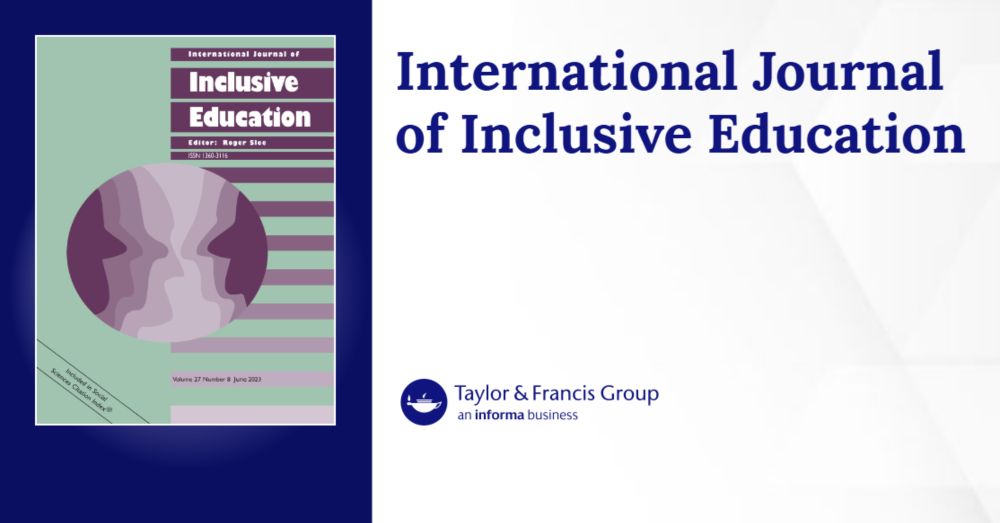
Mental-health lessons in schools sound like a great idea. The trouble is, they don’t work | Lucy Foulkes
All-class therapy sessions don’t help, and may even make matters worse. The evidence shows we need different solutions, says Dr Lucy Foulkes, an academic psychologist at Oxford University
I’m in the Guardian today, arguing that we should stop them all-class mental health lessons in schools
I've thought very carefully about ‘going public’ with this, because it's a sensitive argument to make, especially in the face of so many young people struggling.
(cont 🧵)
tinyurl.com/vun92cz7
21.05.2025 08:13 — 👍 191 🔁 95 💬 12 📌 22

How we dumbed down teaching - and what we must do to fix it
Over the past decade, teaching has been pushed towards a prescriptive model that reduces intellectual curiosity and overlooks essential classroom engagement, argues Sam Gibbs
This is a superb piece. It simultaneously made me want to jump for joy and sit with my head in my hands and weep. Pretty much everything Sam Gibbs argues for is what I've been on about for the last decade or more - losses that I've witnessed that have transformed
www.tes.com/magazine/tea...
1/
07.05.2025 19:08 — 👍 29 🔁 7 💬 3 📌 0
I shed so many tears reading that book
03.05.2025 21:52 — 👍 1 🔁 0 💬 0 📌 0

Workload
A poor perception of workload was a common issue across all respondents, and was not determined by use, or non-use, of standardised curricula. There were no significant differences between the workload perceptions of non-standardised curriculum users and standardised curriculum users. This finding applied to both primary and secondary teachers, and to both full and part-time teachers.
Workload’ emerged from the study as a highly complex issue that cannot be reduced to a simplistic notion of ‘hours worked’. Curriculum design and lesson planning are clearly activities that require time. However, if these are activities that teachers value, then trying to remove these activities from teachers to tackle workload issues does not necessarily tackle the ‘work strain’ that teachers experience.
It may also be the case that standardised curricula have not reduced teacher workload, but have simply changed its nature. Instead of spending time researching material and selecting resources, teachers are spending time interpreting and adapting generic materials to meet the needs of their pupils.
The interviews suggested that teachers saw standardised curricula as having positive uses that were limited and precise: to cover for absence, to compensate for a lack of specialist knowledge, to reduce aspects of workload, and to mitigate the problems of high teacher turnover. Beyond discussion of these uses, respondents repeatedly expressed concerns about a range of issues related to autonomy, self- efficacy and workload:
standardised curricula embodied a lack of trust in teacher expertise;
teachers lacked the freedom to adapt standardised curricula to meet the particular needs of their pupils;
standardised curricula functioned as a control mechanism to monitor teachers’ work;
practices of collaborative and flexible planning were being replaced by standardised commercial or in-house curriculum packages ‘imposed from above’;
Worth reading:
NEU's research into:
The impact of standardised curricula on teacher professionalism
#UKEd
neu.org.uk/latest/libra...
29.04.2025 10:09 — 👍 4 🔁 1 💬 0 📌 0
This.
23.04.2025 16:25 — 👍 3 🔁 3 💬 1 📌 0

I just LOVE this from @emmaturner75.bsky.social's recent blog. It gives me such confidence in the amazing practitioners out there like her & it's great to see that there's such an appetite for the kind of English teaching I've spent my whole career doing, arguing for & trying to offer support for!
22.04.2025 10:35 — 👍 10 🔁 4 💬 1 📌 0
There's some debate about my piece on X & a blog by David Didau agreeing with much of what I say but warning against a return to 'some mythical version of the past'. I've written a response to this idea of a 'myth' of a different kind of English on my own blog: www.barbarableiman.com/post/a-respo...
21.04.2025 09:23 — 👍 11 🔁 5 💬 2 📌 0
"It would recognise that good teaching often involves navigating tensions between competing aims – freedom and structure, tradition and innovation, care and rigour. And it would treat evidence not as a mandate, but as a resource for deliberation and reflection."
16.04.2025 05:05 — 👍 9 🔁 5 💬 1 📌 0
“truthfully, we've got to change the culture that they're consuming and the means by which our technology is facilitating this culture.”
22.03.2025 11:30 — 👍 3 🔁 0 💬 0 📌 0
The key, for me, is to ensure that teaching is "recursive", as in, it is a back-and-forth endeavour in which students and teacher converse to ensure each party understands the other. These feedback loops need to be frequent, but are removed in the current Taylorist movement which linearises teaching
09.03.2025 10:37 — 👍 11 🔁 4 💬 1 📌 0

Only 5% of UK medical school entrants are working class, data shows
Sutton Trust says underrepresentation of poorer students is ‘outrageous’ but number has doubled in 10 years to 2022
Students from working class backgrounds still make up only 5% of entrants to medical schools across the UK.
This is what happens when widening participation is an activity rather than a central guiding mission.
www.theguardian.com/society/2025...
27.02.2025 05:58 — 👍 8 🔁 8 💬 1 📌 1
Seriously! Why do so many scientific, educational, and media outlets still include an X/Twitter "share" button with no corresponding one for Bluesky?
Read the room, folks.
23.02.2025 16:04 — 👍 102 🔁 21 💬 3 📌 2
This is the most clear-eyed thing I have read on the intent and likely consequences of what is happening in the US federal govt
23.02.2025 18:53 — 👍 10 🔁 6 💬 0 📌 0


Great way to start the day
01.02.2025 12:59 — 👍 1 🔁 0 💬 0 📌 0
This is one of our most provocative episodes of ECF Staffroom, dispelling some #EdNeuroSci myths. @elainelong.bsky.social with Dr Rebecca Gordon youtube.com/watch?v=__zw...
14.12.2024 15:19 — 👍 0 🔁 1 💬 0 📌 0
Unstable situation:
A leader of a complex adaptive system, such as a school, that believes in linear cause-effect control of that system.
Schools respond & adapt to new policies. You can't precisely predict the effect of introducing a new policy and SLT must reciprocate the adaptive dance.
#UKEd
08.12.2024 10:20 — 👍 7 🔁 1 💬 1 📌 0
What happens to the ‘could have beens’? Emily tells us we should really think more about this if we want to improve teacher recruitment. A must listen for anyone wanting to broaden their knowledge of teacher recruitment
01.12.2024 16:07 — 👍 2 🔁 2 💬 0 📌 0
Sort of a bit tired of seeing posts that takes for granted that science is entirely value free. What question did you choose to study? Did you pick it at random? Thought not. What do you measure? Why that and not something else?
26.11.2024 18:54 — 👍 239 🔁 27 💬 38 📌 6
Entirely agree…the problem is not the mutation as such, but the fact that we assume research can or should be implemented with fidelity in the first place
27.11.2024 21:17 — 👍 1 🔁 0 💬 1 📌 0
Psychologist at University of Oxford | Adolescence + mental health
Linktr.ee/lucyfoulkes
Science teacher
Education Director at Carousel Learning
Teacher Trainer
Series Editor: Springboard Science
Currently working as the Executive Officer for the History Teachers’ Association of NSW. I also write (mostly textbooks and articles) and teach on-and-off at UNSW and some secondary schools. History, teaching, writing, music, photography and adventure
I’m Charlotte. I like making stuff.
And I also like films, parenting, reading, TV, friends, politics, fairness, cooking, jokes.
charlottewolfe.sumupstore.com
@charlottewolfe on Substack and Mastadon
Thinking about quitting the other apps 🫠
Executive Director of Education, National Society for Education (Church of England & Church in Wales); Author of ‘Flourishing Together’; Developing Leaders, Shaping Policy, Growing Faith.
UCL Institute of Education Department of Psychology and Human Development
Proud to be part of @ucl.ac.uk @ioe.bsky.social, ranked no. 1 in the world for #Education since 2014.
#WeAreIOE #PsychInEd
Incoming Asst Prof at Rice (2026)
Postdoc @UPenn, Duke PhD
🧠 Cognitive neuroscientist/psychologist exploring how we recall the past & predict the future to change behavior
Interventions for health, climate change, & education
http://sinclairlab-rice.com
Associate prof of psychology Vanderbilt Univ, studies how adults and children learn true and false information, she/her, lkfazio.com
Prof at MIT working on misinformation/fake news, social media, polarization, intuition vs deliberation, cooperation, politics, and religion. (he/him)
https://davidrand-cooperation.com/
Promoting Cognitive Science as a discipline and fostering scientific interchange among researchers in various areas.
🌐 https://cognitivesciencesociety.org
Professor of Cognitive Science, University of Bristol. Homepage: https://www.lewan.uk
Professor of Psychology & Human Values at Princeton | Cognitive scientist curious about technology, narratives, & epistemic (in)justice | They/She 🏳️🌈
www.crockettlab.org
Associate Professor, Psychology @cornelluniversity.bsky.social. Researching thinking & reasoning, misinformation, social media, AI, belief, metacognition, B.S., and various other keywords. 🇨🇦
https://gordonpennycook.com/
Neuro prof at Princeton, social media cynic.
Picower Professor of Neuroscience @ MIT
Cognitive neuroscience, executive brain functions, consciousness, and bass guitar. You know, the good stuff.
ekmillerlab.mit.edu
Co-founder, Neuroblox
https://www.neuroblox.ai/
Cognitive and developmental scientist at Temple University
Professor of Philosophy, Psychology and Neuroscience at Duke University. Director of the Imagination and Modal Cognition Lab - www.imclab.org. Pun aficionado. (he/him/el) 🇨🇴
Professor of Cognitive Neuroscience.
Co-director of York Neuroimaging Centre (YNiC).
Interested in memory, spatial navigation and brain imaging.
He/Him
http://www.aidanhorner.org/
Cognitive scientist studying how we see + think @ Johns Hopkins University. 🇨🇦
Lab: https://perception.jhu.edu/



















